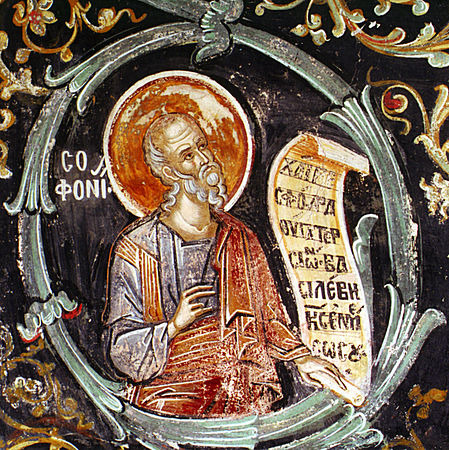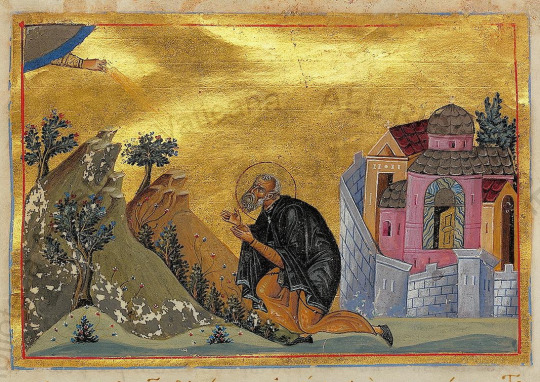#oldama
Explore tagged Tumblr posts
Text

3 decembrie: Sfântul Proroc Sofronie
Sfântul Proroc Sofronie (Sophronias / Zephaniah) a fost contemporan cu prorocul Ieremia și profeteasa Oldama. A provenit din seminția lui Siomion și a fost al nouălea din cei proroci mai mici din Vechiul Testament.
https://www.diane.ro/2024/12/3-decembrie-sfantul-proroc-sofronie.html
0 notes
Photo

they dance to old people music lmao
30 notes
·
View notes
Photo

Today we celebrate the Holy Prophet Zephaniah. Prophet Zephaniah (Sophonias) was a contemporary of the Prophet Jeremiah and the Prophetess Oldama. He was from the tribe of Simeon, and was the ninth of the Twelve Minor Prophets of the Old Testament. The prophet lived at the royal court, where he preached repentance and helped King Josiah eliminate idol-worship. He prophesied about the calamities that were to come for the people of Judea and the surrounding regions: Gaza, Ascalon, Crete, and against the Moabites, the Ammonites and the Ninevites. May he intercede for us always + Source: https://www.oca.org/saints/lives/2022/12/03/103465-prophet-zephaniah (at Jerusalem Palestine) https://www.instagram.com/p/ClrVV1VrNaG/?igshid=NGJjMDIxMWI=
6 notes
·
View notes
Text
Saints&Reading: Thu., Dec. 16, 2021
December 16_December 3
THE PROPHET ZEPHANIAH (SOPHONIAS_ 635 B.C)

The Prophet Zephaniah (Sophonias) was a contemporary of the Prophet Jeremiah and the Prophetess Oldama. He was from the tribe of Simeon, and was the ninth of the Twelve Minor Prophets of the Old Testament. The prophet lived at the royal court, where he preached repentance and helped King Josiah eliminate idol-worship.
He prophesied about the calamities that were to come for the people of Judea and the surrounding regions: Gaza, Ascalon, Crete, and against the Moabites, the Ammonites and the Ninevites.
THE MONK JOHN THE SILENT (558)

Saint John the Silent was born around 454 in the city of Nicopolis, Armenia into the family of a military commander named Enkratius and his wife Euphemia. The boy began to study Holy Scripture, and he loved solitude and prayer with all his heart.
With the inheritance his parents left him, John built a church dedicated to the Most Holy Theotokos. At eighteen years of age, John became a monk, living an ascetic life of fasting, prayer, and temperance with ten other monks at the church he had founded.
At the request of the citizens of Colonia, the Metropolitan of Sebaste consecrated the twenty-eight-year-old John as Bishop of Colonia. Having assumed the episcopal throne, the saint did not alter his strict ascetic manner of life. Under the influence of the saint his relatives, his brother Pergamios (an associate of the emperors Zeno and Anastasius) and his nephew Theodore (an associate of the emperor Justinian), also lived in a Christian manner.
In John’s tenth year as bishop, the governorship of Armenia was assumed by Pazinikos, the husband of the saint’s sister, Maria. The new governor began to interfere in spiritual and ecclesiastical matters, and there was unrest in the Church. Saint John then went to Constantinople, and through Archbishop Euthymius, he entreated the emperor Zeno to defend the Armenian Church from the evil Governor.
Overwhelmed by worldly quarrels, John secretly left his diocese and sailed to Jerusalem. With tears he besought God to show him a place where he might live and find salvation. A bright star appeared, which led Saint John to the Lavra of Saint Savva.
John, concealing his episcopal rank, was accepted in the community as a simple novice. Under the guidance of the igumen Saint Savva(December 5), Bishop John toiled obediently for more than four years at every task he was assigned. When a guesthouse was built at the Lavra, Saint John served the workers, serving their food and assisting in the construction of the building. When a cenobitic monastery for novices was being built, John was once again assigned to help the workers.
Seeing Saint John’s humility and love of labor, Saint Savva deemed him worthy of ordination to presbyter. Saint John was forced to reveal his rank to Patriarch Elias of Jerusalem (494-517), who told Saint Savva that John could not be ordained. Moreover, he said that John was to live in silence, and that no one should trouble him. Soon the Lord also revealed Saint John’s secret to Saint Savva. Saint John spent four years in his cell, receiving no one and not going out even for church.
Desiring ever greater solitude and increased abstinence, Saint John quit the Lavra and withdrew into the desert, where he spent more than nine years, eating plants and grass. He survived a devastating incursion of the Saracens and did not perish, only because the Lord sent him a defender: a ferocious lion. When the enemy tried to harm the saint, the lion attacked them and they scattered in fright. Tradition speaks of many miracles Saint John performed during this time in the desert.
When Saint Savva returned after an extended stay in Scythopolis, he persuaded Saint John to forsake the wilderness and to live at the monastery. After this, the Lord, in a miraculous way, revealed to everyone at the Lavra that the monk John was actually a bishop.
When Saint John reached age seventy, his holy and God-bearing spiritual Father Saint Savva died. The saint grieved deeply over this, since he was not present at the time. Saint Savva appeared to him in a vision, and having consoled him, he foretold that there would be much toil ahead in the struggle against heresy. Saint John even had to leave his solitude to strengthen the brethren in the struggle with the Origenists.
Saint John the Silent spent sixty-six years at the Lavra of Saint Savva the Sanctified. Through his constant ascetic efforts, by his untiring prayer and humble wisdom, Saint John acquired the grace of the Holy Spirit. At his prayers, many miracles took place, and he was able to discern the secret thoughts of people. He healed the sick and those possessed by demons. Even during his lifetime he saved those who invoked his name from certain destruction. Once, he scattered fig seeds on barren rock, and a beautiful and fruitful tree sprang up. In time, the tree grew so much that it overshadowed the saint’s cell.
Saint John the Silent departed to the Lord in peace at the age of 104.
Source: Orthodox Chruch in America


LUKE 20:9-18
9 Then He began to tell the people this parable: "A certain man planted a vineyard, leased it to vinedressers, and went into a far country for a long time. 10 Now at vintage-time he sent a servant to the vinedressers, that they might give him some of the fruit of the vineyard. But the vinedressers beat him and sent him away empty-handed. 11 Again he sent another servant; and they beat him also, treated him shamefully, and sent him away empty-handed. 12 And again he sent a third; and they wounded him also and cast him out. 13 Then the owner of the vineyard said, 'What shall I do? I will send my beloved son. Probably they will respect him when they see him.' 14 But when the vinedressers saw him, they reasoned among themselves, saying, 'This is the heir. Come, let us kill him, that the inheritance may be ours.' 15 So they cast him out of the vineyard and killed him. Therefore what will the owner of the vineyard do to them? 16 He will come and destroy those vinedressers and give the vineyard to others. And when they heard it they said, "Certainly not!" 17 Then He looked at them and said, "What then is this that is written:'The stone which the builders rejected Has become the chief cornerstone'? 18 Whoever falls on that stone will be broken; but on whomever it falls, it will grind him to powder.
1 TIMOTHY 3:1-13
1 This is a faithful saying: If a man desires the position of a bishop, he desires a good work. 2 A bishop then must be blameless, the husband of one wife, temperate, sober-minded, of good behavior, hospitable, able to teach; 3 not given to wine, not violent, not greedy for money, but gentle, not quarrelsome, not covetous; 4 one who rules his own house well, having his children in submission with all reverence 5 (for if a man does not know how to rule his own house, how will he take care of the church of God?); 6 not a novice, lest being puffed up with pride he fall into the same condemnation as the devil. 7 Moreover he must have a good testimony among those who are outside, lest he fall into reproach and the snare of the devil. 8 Likewise deacons must be reverent, not double-tongued, not given to much wine, not greedy for money, 9 holding the mystery of the faith with a pure conscience. 10 But let these also first be tested; then let them serve as deacons, being found blameless. 11 Likewise, their wives must be reverent, not slanderers, temperate, faithful in all things. 12 Let deacons be the husbands of one wife, ruling their children and their own houses well. 13 For those who have served well as deacons obtain for themselves a good standing and great boldness in the faith which is in Christ Jesus.
#orthodoxy#orthodoxchristianity#originofchristianity#spirituality#holyscriptures#gospel#bible#wisdom
3 notes
·
View notes
Text
Saints&Reading: Wed., Dec, 16, 2020
Commemorated on December 3
The Prophet Sophonias (or Zephaniah_ 635 B.C.)

The Prophet Sophonias (or Zephaniah) was a contemporary of the Prophet Jeremiah and the Prophetess Oldama. He was of illustrious lineage [from the tribe of Simeon, and was the 9th of the Twelve Minor Prophets of the Old Testament]. The prophet lived at the royal court, where he preached repentance and helped king Josiah extirpate idol-worship. He prophesied about the calamities that were to come for the people of Judea and the surrounding regions: Gaza, Ascalon, Crete, and against the Moabites, the Ammonites and the Ninevites.


Luke 20:1-8
1Now it happened on one of those days, as He taught the people in the temple and preached the gospel, that the chief priests and the scribes, together with the elders, confronted Him 2 and spoke to Him, saying, "Tell us, by what authority are You doing thesethings? Or who is he who gave You this authority?" 3 But He answered and said to them, "I also will ask you one thing, and answer Me: 4 The baptism of John-was it from heaven or from men? 5 And they reasoned among themselves, saying, "If we say, 'From heaven,' He will say, 'Why then did you not believe him?' 6 But if we say, 'From men,' all the people will stone us, for they are persuaded that John was a prophet.7 So they answered that they did not know where it was from. 8 And Jesus said to them, "Neither will I tell you by what authority I do these things."
2 Timothy 4:9-22
9Be diligent to come to me quickly; 10for Demas has forsaken me, having loved this present world, and has departed for ThessalonIca-Crescens for Galatia, Titus for Dalmatia.11 Only Luke is with me. Get Mark and bring him with you, for he is useful to me for ministry.12 And Tychicus I have sent to Ephesus. 13 Bring the cloak that I left with Carpus at Troas when you come-and the books, especially the parchments.14 Alexander the coppersmith did me much harm. May the Lord repay him according to his works.15 You also must beware of him, for he has greatly resisted our words. 16 At my first defense no one stood with me, but all forsook me. May it not be charged against them. 17 But the Lord stood with me and strengthened me, so that the message might be preached fully through me, and that all the Gentiles might hear. Also I was delivered out of the mouth of the lion. 18 And the Lord will deliver me from every evil work and preserve me for His heavenly kingdom. To Him be glory forever and ever. Amen! 19 Greet Prisca and Aquila, and the household of Onesiphorus. 20 Erastus stayed in Corinth, but Trophimus I have left in Miletus sick. 21 Do your utmost to come before winter. Eubulus greets you, as well as Pudens, Linus, Claudia, and all the brethren. 22 The Lord Jesus Christ be with your spirit. Grace be with you. Amen.
#orthodoxy#orthodox christianity#ancientfaith#originofchristianity#spirituality#holyscripture#gospel#sacred texts#wisdom
2 notes
·
View notes
Text
Saints&Reading: Mon., Dec. 3, 2018
Prophet Zephaniah

The Prophet Zephaniah (Sophonias) was a contemporary of the Prophet Jeremiah and the Prophetess Oldama. He was from the tribe of Simeon, and was the ninth of the Twelve Minor Prophets of the Old Testament. The prophet lived at the royal court, where he preached repentance and helped King Josiah eliminate idol-worship. He prophesied about the calamities that were to come for the people of Judea and the surrounding regions: Gaza, Ascalon, Crete, and against the Moabites, the Ammonites and the Ninevites...continue reading OCA
Venerable Savva of Zvenigorod

Saint Sava Storozhevsky of Zvenigorod left the world in his early youth, and received the monastic tonsure from Saint Sergius of Radonezh, whose disciple and fellow-ascetic he was. Saint Sava loved solitude, and avoided conversing with people. He lived in constant toil, lamenting the poverty of his soul, and trembling before the judgment of God. He was a model of simplicity and humility, and he attained to such a depth of spiritual wisdom that “in the monastery of Saint Sergius he was a spiritual confessor to all the brethren, a venerable and exceedingly learned Elder.” When Great Prince Demetrius of the Don built the monastery of the Dormition of the Mother of God at the River Dubenka, in gratitude for the victory over Mamai, Sava became its Igumen, with the blessing of Saint Sergius. Preserving the simple manner of his ascetic lifestyle, he ate plants, wore coarse clothing and slept on the ground...continue reading OCA
Tim 2:20-26
20 But in a great house there are not only vessels of gold and silver, but also of wood and clay, some for honor and some for dishonor. 21 Therefore if anyone cleanses himself from the latter, he will be a vessel for honor, [a]sanctified and useful for the Master, prepared for every good work. 22 Flee also youthful lusts; but pursue righteousness, faith, love, peace with those who call on the Lord out of a pure heart. 23 But avoid foolish and ignorant disputes, knowing that they generate strife. 24 And a servant of the Lord must not quarrel but be gentle to all, able to teach, patient, 25 in humility correcting those who are in opposition, if God perhaps will grant them repentance, so that they may know the truth, 26 and that they may come to their senses and escape the snare of the devil, having been taken captive by him to do his will.
Footnotes:
2 Timothy 2:21 set apart
Luke 20:27-44
27 Then some of the Sadducees, who deny that there is a resurrection, came to Him and asked Him, 28 saying: “Teacher, Moses wrote to us that if a man’s brother dies, having a wife, and he dies without children, his brother should take his wife and raise up offspring for his brother. 29 Now there were seven brothers. And the first took a wife, and died without children. 30 And the second [a]took her as wife, and he died childless. 31 Then the third took her, and in like manner the seven [b]also; and they left no children, and died. 32 Last of all the woman died also. 33 Therefore, in the resurrection, whose wife does she become? For all seven had her as wife.”
34 Jesus answered and said to them, “The sons of this age marry and are given in marriage. 35 But those who are counted worthy to attain that age, and the resurrection from the dead, neither marry nor are given in marriage; 36 nor can they die anymore, for they are equal to the angels and are sons of God, being sons of the resurrection. 37 But even Moses showed in the burning bush passage that the dead are raised, when he called the Lord ‘the God of Abraham, the God of Isaac, and the God of Jacob.’ 38 For He is not the God of the dead but of the living, for all live to Him.”
39 Then some of the scribes answered and said, “Teacher, You have spoken well.” 40 But after that they dared not question Him anymore.
Jesus: How Can David Call His Descendant Lord?
41 And He said to them, “How can they say that the Christ is the Son of David? 42 Now David himself said in the Book of Psalms:
‘The Lord said to my Lord, “Sit at My right hand, 43 Till I make Your enemies Your footstool.” ’
44 Therefore David calls Him ‘Lord’; how is He then his Son?”
Footnotes:
Luke 20:30 NU omits the rest of v. 30.
Luke 20:31 NU, M also left no children
New King James Version (NKJV)
Scripture taken from the New King James Version®. Copyright © 1982 by Thomas Nelson. All rights reserved. via biblegateway.com
#orthodox#&orthodoxy#bible#saints#apostles#prophetes#ancientchristianity#ancientfaith#Christian#christianity
3 notes
·
View notes